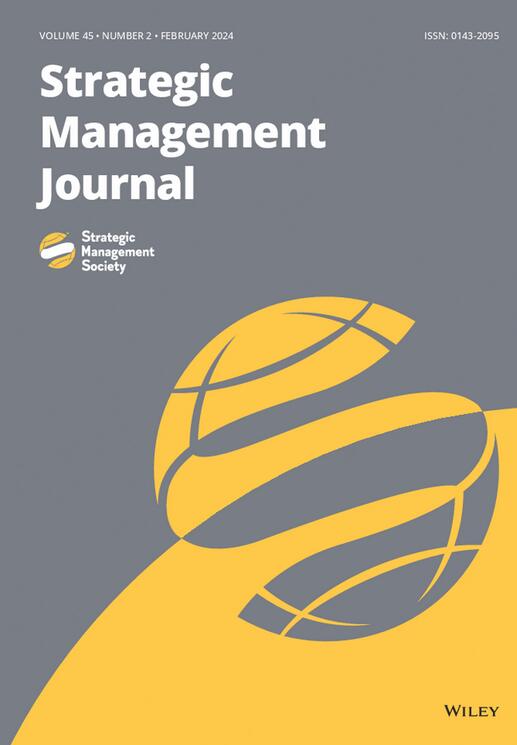设定基调,以达到自己的目的:自恋型首席执行官如何以注意力为基础影响董事会承担更多风险
IF 7.2
1区 管理学
Q1 BUSINESS
引用次数: 0
摘要
研究摘要上层社会的研究对首席执行官自恋的组织后果产生了深刻的见解。然而,对这些后果的发生机制进行实证关注的研究较少。利用基于注意力的观点,我们引入了一个过程模型,研究首席执行官的自恋如何通过董事会会议期间关于风险承担的讨论基调与公司的风险承担相联系。我们进一步指出,自恋型首席执行官在被任命为董事会主席后,其承担风险的能力会增强。我们利用一个独特的公司董事会会议记录数据集,涵盖了 20 年间 88 家上市公司和 197 位首席执行官,发现我们的每一个假设都得到了强有力的支持。我们的研究结果表明,自恋型首席执行官善于控制董事会的注意力焦点,以达到自己的目的。管理总结我们的研究为首席执行官的自恋如何影响公司的冒险行为提供了解释。具体来说,我们证明了自恋型首席执行官很容易促使董事会在讨论风险承担时保持积极的基调--尤其是当他们同时担任董事会主席时--从而使他们能够为风险承担战略分配更多的资源。通过对 88 家公司长达 20 年的董事会会议记录进行广泛分析,我们说明了自恋型首席执行官是如何发挥巨大影响力,使董事会的讨论反映出他们自己的亲风险倾向的。这一见解进一步说明了了解首席执行官的行为对指导未来风险管理战略的重要性。本文章由计算机程序翻译,如有差异,请以英文原文为准。
Setting the tone to get their way: An attention‐based approach to how narcissistic CEOs influence the board of directors to take more risk
Research SummaryUpper echelons research has generated insights into the organizational consequences of CEO narcissism. However, fewer studies have empirically attended to the mechanisms through which these consequences occur. Using the attention‐based view, we introduce a process model examining how CEO narcissism is linked to corporate risk‐taking through the board of director discussion tone of risk‐taking during board meetings. We further note that narcissistic CEOs have an increased ability to do so when they are appointed to be board chair. We find strong support for each of our hypotheses by utilizing a unique data set of corporate board meeting transcripts encompassing 88 public firms and 197 CEOs over 20 years. Our results suggest that narcissistic CEOs are adept at controlling the attentional foci of boards of directors to get their way.Managerial SummaryOur study offers an explanation as to how CEO narcissism influences firm risk‐taking behavior. Specifically, we demonstrate that narcissistic CEOs are prone to drive board discussions about risk‐taking to hold a positive tone—especially when they also serve as board chair—thereby enabling them to allocate increased resources toward risk‐taking strategies. Through an extensive analysis of board meeting transcripts spanning two decades across 88 companies, we illustrate how narcissistic CEOs wield substantial influence in molding board conversations to mirror their own pro‐risk inclinations. This insight further considers the importance of understanding CEO behavior in guiding risk management strategies in the future.
求助全文
通过发布文献求助,成功后即可免费获取论文全文。
去求助
来源期刊

Strategic Management Journal
Multiple-
CiteScore
13.70
自引率
8.40%
发文量
109
期刊介绍:
At the Strategic Management Journal, we are committed to publishing top-tier research that addresses key questions in the field of strategic management and captivates scholars in this area. Our publication welcomes manuscripts covering a wide range of topics, perspectives, and research methodologies. As a result, our editorial decisions truly embrace the diversity inherent in the field.
 求助内容:
求助内容: 应助结果提醒方式:
应助结果提醒方式:


